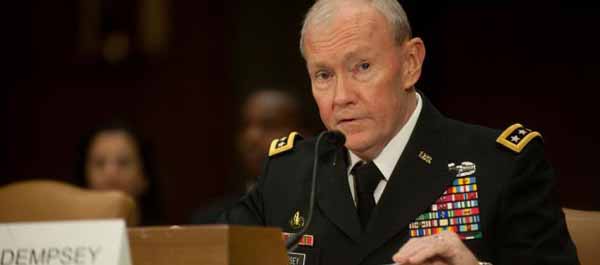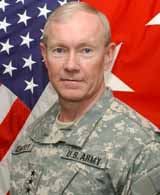Ralph Peters Exclusive: New Chairman, New Challenges: General Dempsey and the Tough Times Ahead

The U.S. Armed Forces just got their Irish up. Literally. It’s impossible to have contact longer than a few seconds with General Martin E. Dempsey, just nominated to become the next chairman of the Joint Chiefs of Staff, without learning how proud he is of his Irish-American heritage. “Marty” Dempsey even has been known to break into Irish ballads (in a fine tenor) at social events. And I have yet to meet an officer or soldier who doesn’t revere the guy.
{default}That’s a good thing, because Dempsey is going to need a lot of goodwill and support during his tenure as CJCS. Not since the dismal “hollow Army” period that followed our Indochina wars has a chairman faced such a cascade of challenges.
First, the fat-budget years are over. And even those weren’t all that fat, given how many resources our past decade of wars drained from a military that was rich on paper, but — at least as regards the Army and Marine Corps — badly stretched. Now, with the drawdown from Iraq largely completed and an impending reduction in forces deployed to Afghanistan, members of Congress and administration power-players are going to demand a “peace dividend” to protect funding for the entitlement programs that actually deliver votes in their home districts.
At best, future defense budgets will be flat. Odds are better, though, that we’ll see real cuts. Especially if entitlement programs are trimmed, it will be difficult for the Pentagon to argue that it shouldn’t share the pain. If pressed, our military could survive judicious nips and tucks, but the likelihood is that any reductions will be determined by politics, not by the military’s honest needs.
The last decade saw a massive feeding frenzy for well-connected defense contractors. Now that the party’s ending, those contractors will go after the military’s personnel accounts and each other as they fight to retain as many contracts as possible. With noteworthy exceptions, members of Congress, while insisting that they revere our troops no end, will side with business interests from their home districts when it comes time to apportion funds. Just the way that it works, folks.
 General Dempsey will need the courage — and political backing — to stand up for the core needs of the services, from adequate troop strength to those new or replacement systems genuinely vital to our national defense and global interests. The pressures exerted on the new chairman from all sides will be enormous. Nor will it all comes from outside of “the Building.” As resources diminish, the services will maneuver against each other as they compete for the largest possible slice of a dwindling pie (factions within each service also will compete with each other, as well: fighters vs. bombers; carriers vs. submarines; light-fighters vs. heavy metal…). Dempsey’s tenure is going to be marked by some very ugly food-fights inside the Beltway.
General Dempsey will need the courage — and political backing — to stand up for the core needs of the services, from adequate troop strength to those new or replacement systems genuinely vital to our national defense and global interests. The pressures exerted on the new chairman from all sides will be enormous. Nor will it all comes from outside of “the Building.” As resources diminish, the services will maneuver against each other as they compete for the largest possible slice of a dwindling pie (factions within each service also will compete with each other, as well: fighters vs. bombers; carriers vs. submarines; light-fighters vs. heavy metal…). Dempsey’s tenure is going to be marked by some very ugly food-fights inside the Beltway.
The hardest account to protect will be personnel. First, troops are, indeed, expensive, and our “Trojan War” in Afghanistan on top of the poorly managed campaign in Iraq have increased warm-body costs dramatically due to the nature of medical care required for multiple amputees and PTSD sufferers alike (as well as for amputees afflicted with PTSD). As we learn more about the unexpected physical and corollary effects of concussion waves from IEDs, for example, the prospects for active-duty and Veterans Administration health-care costs look grim. Toss in the level of pay and benefits provided to today’s professionals (we’re already hearing calls for pay cuts from stay-at-home politicians), and personnel accounts look like an enormous cow that isn’t really sacred in the least.
Even though those who’ve served understand the need for well-trained, well-disciplined troops in adequate numbers to be available at the beginning of a conflict, those who live inside the Washington bubble are more easily persuaded that buying a “wonder-weapon” built with parts from their electoral district is a better investment of our tax dollars than human beings who’ve dedicated their lives to military service.
General Dempsey will have to be the top advocate for our real secret weapon: our troops.
He’s the key man in uniform who’ll have to adjudicate those budget squabbles over what to buy for whom and from whom — and no chairman gets deep loyalty when service interests come into play. The new chairman’s going to need high-quality body armor on the Hill and even in his own office.
Second, Dempsey will assume the chairmanship at a time when the categories of warfare and military disciplines are expanding. Our government only recently — and belatedly — acknowledged that cyber-attacks are, indeed, acts of war in the legal sense. That’s merely step one. Declaring that a cyber-strike that shut down our electrical grid is an act of war still does not guarantee an effective response. There will always be those in Washington who argue against military retaliation, while others will insist on “proportionality,” ignoring the lessons of thousands of years of warfare (if the raiders take your sheep, you don’t just grab their sheep in turn — you level their village and sow the ground with salt: sorry, but that’s what works). Dempsey will have to insist that the Department of Defense develops a realistic (classified) doctrine on cyber-war–and that the president signs off on it. And opponents of a serious approach to defending our country against a cyber-attack will leak every secret they can and spin the issue.
There’s an old Washington saying that, “If you want a friend in this town, get a dog.” But in D.C. the dogs bite their masters, too.
Third, Dempsey faces a world in which a few threats are continuous, but a far greater number are plausible. Terrorism won’t go away and will require constant pressure (thank God for special ops), but, frankly, it’s considerably less of a threat to our security than our national obesity problem. The new chairman will have to deal with Iran’s continuing pursuit of nukes; with Iran’s intent to deploy missiles to Venezuela; with regional subversion in Latin America; with the narco-insurgency ravaging Mexico and haunting our border; with the complex aftermath of the “Arab Awakening”; with China’s epoch-making transformation from inward-looking to globally engaged power; with Russia’s bad-blood inability to behave in a civilized manner for more than fifteen minutes at a stretch; with the “disappearing” militaries in NATO; with the steady Islamization of NATO-member Turkey; with Pakistan’s aggressive support of terrorism; with the inevitable collapse of the Karzai government in Afghanistan; with a potential war between Pakistan and India (Go India!); with resource competition and the consequences of climate change (real or imagined); with piracy; with new genocides; and, perhaps worst of all, with the unexpected: Ten years ago this month, no one expected our forces to be deployed in the hundreds of thousands for a decade in the greater Middle East. The march of history crushes our best predictions under its boots.
General Dempsey is going to earn his 0-10, four-star general’s pay.
But is he up to this supremely demanding job? The truth is that no one ever knows who will make a successful chairman. On the positive side, Dempsey is a superb soldier with extensive experience in combat zones and an agile mind (his upbringing in Armor branch didn’t hinder him in the least when it came to fighting asymmetrical warfare). He cares deeply about the men and women in uniform, and he’s loyal to those he’s been privileged to command. He gets things done, but he doesn’t push himself forward — it’s about the troops and the mission, not about him. He’s intelligent, self-controlled, and able to play well with others. Dempsey is one of the very rare generals about whom I’ve never heard a negative comment.
Yet, there are a few cautionary notes. First, Dempsey has been about “right now,” about dealing with current problems. That’s part of the chairman’s job, but shaping the future force and positioning our military for tomorrow’s strategic challenges (including breaking traditional rice bowls, when necessary) is more important still. And, frankly, my old service, the U.S. Army has spent the last half-century honing its ability to produce great division commanders — a task it has fully mastered. But it hasn’t produced a serious strategist at the general-officer level since the World War II generation. The chairman of the Joint Chiefs isn’t a battlefield commander anymore. He’s the nation’s top strategist in uniform. And when uniformed strategists aren’t up to the job, inept think-tank civilians take over and kill soldiers. General Dempsey must avoid the Gulliver Trap — getting tied down by countless secondary crises-of-the-day and letting others dominate the key issues.
There’s no reason to suppose that Dempsey isn’t capable of rising to the level of global and near-space strategist. But, except for his assignment at the U.S. Central Command a few years ago, his assignments haven’t had a strategic focus. He’s simply an unknown quantity in that arena.
But, then, the Irish are always good for a surprise.
General Marty Dempsey will be confirmed and will embark upon his new job in October. He’s going to be challenged from his first day as chairman. He’s tough enough, and he’s smart enough. Now his proven physical courage will have to be matched by moral courage, a rare commodity in Washington. He’ll need backbone, vision and wisdom, the integrity to tell the president when something just isn’t working, and the forthrightness to tell Congress that the seven-wheeled, 10G-network, bio-fueled bicycle tank that Warbucks Industries insists the military needs is a piece of junk.
He’ll have a strong civilian counterpart in Leon Panetta, the nominee to replace Robert Gates as secretary of defense. Panetta performed with unexpected ability and zeal at the CIA. But the general is going to leave the chairmanship with far more wrinkles on his forehead than any war zone gave him.
Ralph Peters is a longtime member of the Armchair General team; a retired Army officer and former enlisted man; Fox News Strategic Analyst; a journalist; a traveler with experience in over 70 countries; and the author of 28 books, including the forthcoming “Lines Of Fire”, a collection of his most-enduring writing on military affairs (Stackpole, September 2011), and “Cain At Gettysburg”, a new and brutally realistic novel of our nation’s greatest battle (Forge, March 2012).

